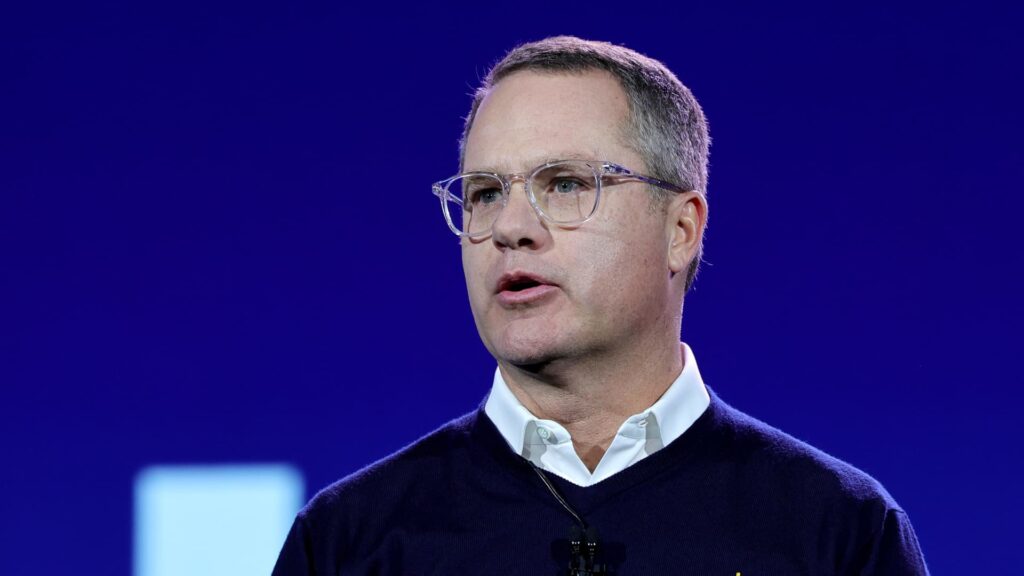Doug McMillon’s career at Walmart started when he was in high school, picking up orders and unloading trailers at a warehouse. It’ll end with a successful 12-year run as the retail giant’s CEO.
McMillon will retire from the role on Jan. 31, 2026, after almost 12 years at the retail giant’s helm, Walmart announced on Friday. The 59-year-old from Memphis, Tennessee, became Walmart’s fifth CEO in February 2014, and his career arc is noteworthy: McMillon first joined Walmart in 1984 as an hourly associate, and held a variety of roles at the company as he moved up the ranks.
He became CEO and president of Walmart-owned Sam’s Club from 2005 to 2009, and held the same titles at Walmart International from 2009 to 2014. His decades of experiences working with different teams at Walmart influenced his leadership philosophies, he’s said.
“I think the thing that’s been consistent [throughout my time at Walmart] is that this is a team sport and nothing happens through the work of just an individual,” McMillon said in a May 21 episode of Stanford Graduate School Of Business’ “View From The Top” podcast. “We all do this together. And it doesn’t matter whether you’re going to do a startup or you’re at a big company, that’s going to be the case.”
DON’T MISS: The ultimate guide to using AI to communicate better
When McMillon became Walmart’s CEO, he prioritized “three core principles” to guide the company’s direction, he said at a Walmart shareholders meeting on June 6, 2014. “First, we will be a customer-driven company … Second, we will invest in our people … Finally, we need to be at the forefront of innovation and technology. We will lead with urgency to get ahead of change.”
Walmart had been a brick-and-mortar giant for decades, and McMillon’s bet on digital drew some skepticism. It also caused a major stock sell-off: In October 2015, the company reduced its full-year sales projections after increasing spending on wage increases and its e-commerce and digital platforms — and shares plunged as much as 10 percent, causing Walmart to lose more than $20 billion in market cap.
“People in the technology industry have been predicting that brick-and-mortar-based businesses like Walmart are going to end up really struggling, and I think that that’s actually now coming to the fore in this powerful way today,” Founders Fund partner Geoff Lewis told CNBC at the time.
But Walmart said it anticipated an earnings recovery by its 2019 fiscal year, and McMillon’s plan ultimately paid off in spades. Walmart’s annual revenues have increased steadily since 2018 — including during the Covid-19 pandemic, when shoppers increasingly took advantage of mobile and web ordering — as it competes with Amazon. Walmart’s shares have risen nearly 300% since McMillon’s first day as CEO, CNBC reported on Friday.
During that time, Walmart launched new fulfillment centers for processing online orders and broadened its same-day or following-day pickup program for customers on mobile devices, among other tech-forward initiatives. More recently, the company announced plans to deploy millions of battery-free “ambient Internet of Things” sensors to its U.S. supply chain, to more effectively track its inventory pallets nationwide.
McMillon is considered young for a retiring CEO of a large company, particularly one who’s had a successful tenure. In recent years, other large businesses have waived or changed their mandatory CEO retirement age — typically 65, for a number of U.S. corporations — so their chief executives can stay on for longer.
“Serving as Walmart’s CEO has been a great honor and I’m thankful to our Board and the Walton family for the opportunity,” McMillon said in a statement on Friday. “I’m incredibly proud of what our associates accomplished and deeply grateful for their commitment to our customers, to each other and to the communities we serve. Thank you, everyone!”
Now, he’s passing the baton to John Furner, Walmart’s current head of U.S. operations who’s been at the company for over 30 years. Furner, 51, has a similar tenure at the company: He started as an hourly associate in 1993 and climbed the ranks in a variety of roles. Like McMillon, Furner also previously served as CEO of Sam’s Club.
Furner’s “curiosity and digital acumen combined with a deep commitment to our people and culture will enable him to take us to the next level,” McMillon said in Friday’s statement.
Want to level up your AI skills? Sign up for Smarter by CNBC Make It’s new online course, How To Use AI To Communicate Better At Work. Get specific prompts to optimize emails, memos and presentations for tone, context and audience.
Plus, sign up for CNBC Make It’s newsletter to get tips and tricks for success at work, with money and in life, and request to join our exclusive community on LinkedIn to connect with experts and peers.


